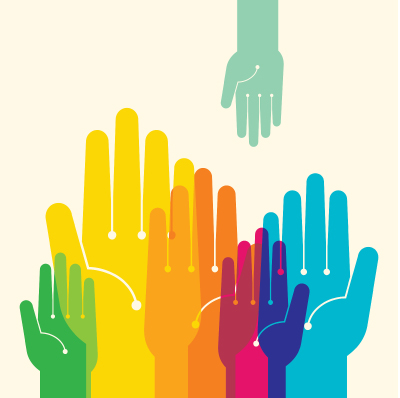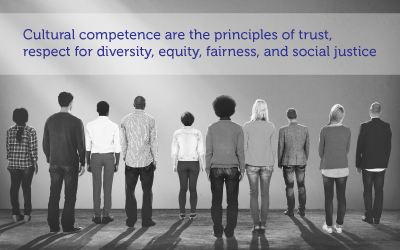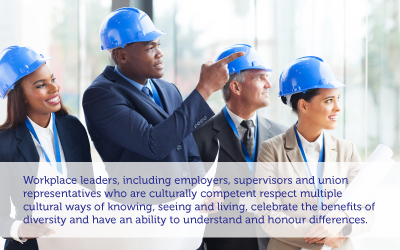What does it mean to be culturally competent?
Cultural competence is about our will and actions to build understanding between people, to be respectful and open to different cultural perspectives, strengthen cultural security and work towards equality in opportunity. Relationship building is fundamental to cultural competence and is based on the foundations of understanding each other’s expectations and attitudes, and subsequently building on the strength of each other’s knowledge, using a wide range of community members and resources to build on their understandings.
In Canada, we have talked for a long time about the importance of respecting diversity and embracing a range of cultures as part of the social fabric of our society. However the term, cultural competence, is a relatively new concept to many.

Over the past two or three decades we have endeavoured to challenge and address injustice, racism, exclusion and inequity through legislation, awareness raising, rights education and an anti-bias curriculum. Cultural competence reinforces and builds on this work.
So what does cultural competence mean and why is it so important for people to have their culture and cultural backgrounds acknowledged, respected and valued?
Underlying cultural competence are the principles of trust, respect for diversity, equity, fairness, and social justice… Culture is the fundamental building block of identity and the development of a strong cultural identity is essential to an individual’s healthy sense of who they are and where they belong.

It is more than being respectful of the cultures represented in the service or even the community. It is much more than awareness of cultural differences, more than knowledge of the customs and values of those different to our own.
Cultural competence is the ability to understand, communicate with and effectively interact with people across cultures. Cultural competence encompasses
- being aware of one’s own world view
- developing positive attitudes towards cultural differences
- gaining knowledge of different cultural practices and world views
- developing skills for communication and interaction across cultures.
Cultural proficiency “requires more than becoming culturally aware or practising tolerance”. Rather, it is the ability to “identify and challenge one’s own cultural assumptions, values and beliefs, and to make a commitment to communicating at the cultural interface”.
Principles relevant to cultural competence include fostering secure, respectful and reciprocal relationships, partnerships, high expectations and equity and respect for diversity.
We are all are born belonging to a culture, which is not only influenced by traditional practices, heritage and ancestral knowledge, but also by the experiences, values and beliefs of individual families and communities. Respecting diversity means valuing and reflecting the practices, values and beliefs of families and communities.
What does cultural competence look like in practice?
Workplace leaders, including employers, supervisors and union representatives who are culturally competent respect multiple cultural ways of knowing, seeing and living, celebrate the benefits of diversity and have an ability to understand and honour differences.
In practical terms, it is a never ending journey involving critical reflection, of learning to understand how people perceive the world and participating in different systems of shared knowledge.

Cultural competence is not static, and our level of cultural competence changes in response to new situations, experiences and relationships. The three elements of cultural competence are:
- attitudes
- skills
- knowledge
These are important at three levels:
- individual level – the knowledge, skills, values, attitudes and behaviours of individuals
- service level – management and operational frameworks and practices, expectations, including policies, procedures, vision statements and the voices of children, families and community
- the broader system level – how services relate to and respect the rest of the community, agencies, Elders, local community protocols.
While there is no checklist to tick off to identify culturally competent workplace leaders, we can start to build a picture of the attitudes, skills and knowledge required. For example, workplace leaders who respect diversity and are culturally competent:
- have an understanding of, and honour, the histories, cultures, languages, traditions, child rearing practices
- value individual’s different capacities and abilities
- respect differences in families’ home lives
- recognise that diversity contributes to the richness of our society and provides a valid evidence base about ways of knowing
- demonstrate an ongoing commitment to developing their own cultural competence in a two-way process with families and communities
- promote greater understanding of Indigenous ways of knowing and being
- engage in ongoing reflection relating to their cultural competence
[1] Educators’ Guide to the Early Years Learning Framework p21 Educators’ Guide to the Framework for School Age Care, p57
[2] Educators’ Guide to the Early Years Learning Framework p23
[3] Framework for School Age Care in Australia p15 Early Years Learning Framework p16
[4] SNAICC 2012 Consultation Overview on Cultural Competence in Early Childhood Education and Care Services
[5] Early Years Learning Framework in Action p 27
This article has been adapted from one written by Rhonda Livingstone, Australian Children’s Education and Care Quality Authority’s National Education Leader.






